Ford Kuga vs Suzuki S-Cross - Differences and prices compared
Compare performance (243 HP vs 110 HP), boot space and price (34200 £ vs 21800 £ ) at a glance. Find out which car is the better choice for you – Ford Kuga or Suzuki S-Cross?
Costs and Efficiency:
Price and efficiency are key factors when choosing a car – and this is often where the real differences emerge.
Suzuki S-Cross has a decisively advantage in terms of price – it starts at 21800 £ , while the Ford Kuga costs 34200 £ . That’s a price difference of around 12480 £.
Fuel consumption also shows a difference: Ford Kuga manages with 2.80 L and is therefore significantly more efficient than the Suzuki S-Cross with 5.30 L. The difference is about 2.50 L per 100 km.
Engine and Performance:
Power, torque and acceleration say a lot about how a car feels on the road. This is where you see which model delivers more driving dynamics.
When it comes to engine power, the Ford Kuga has a clearly edge – offering 243 HP compared to 110 HP. That’s roughly 133 HP more horsepower.
In terms of top speed, the Ford Kuga performs hardly perceptible better – reaching 200 km/h, while the Suzuki S-Cross tops out at 185 km/h. The difference is around 15 km/h.
There’s also a difference in torque: Ford Kuga pulls hardly perceptible stronger with 240 Nm compared to 235 Nm. That’s about 5 Nm difference.
Space and Everyday Use:
Beyond pure performance, interior space and usability matter most in daily life. This is where you see which car is more practical and versatile.
Both vehicles offer seating for 5 people.
In curb weight, Suzuki S-Cross is to a small extent lighter – 1280 kg compared to 1526 kg. The difference is around 246 kg.
In terms of boot space, the Suzuki S-Cross offers minimal more room – 430 L compared to 412 L. That’s a difference of about 18 L.
In maximum load capacity, the Ford Kuga performs somewhat better – up to 1534 L, which is about 304 L more than the Suzuki S-Cross.
When it comes to payload, Ford Kuga distinct takes the win – 550 kg compared to 405 kg. That’s a difference of about 145 kg.
Who wins the race?
The Ford Kuga proves to be leaves the rival little chance and therefore becomes our DriveDuel Champion!
Ford Kuga is the better all-rounder in this comparison.
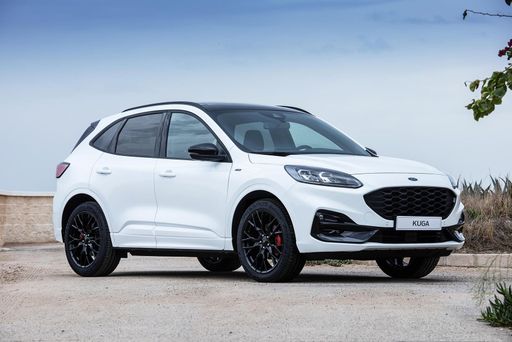
Ford Kuga
Costs and Consumption
View detailed analysis
Engine and Performance
View detailed analysis
Dimensions and Body
View detailed analysis
Ford Kuga
The Kuga is Ford’s adaptable family SUV that blends usable space with a surprisingly lively driving character, making daily commutes and weekend escapes equally enjoyable. With smart interior packaging, an easy-to-use infotainment setup and composed road manners, it’s a sensible choice for buyers who want a bit of fun without the fuss.
details
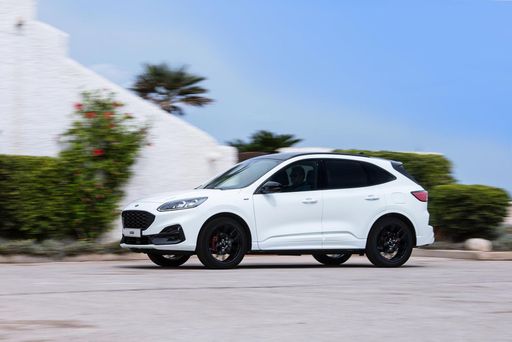

Suzuki S-Cross
The Suzuki S-Cross is a neatly packaged crossover that puts everyday practicality ahead of showy theatrics, offering a comfortable cabin and predictable handling that suit family life and weekend errands alike. It’s not a headline-grabber, but its sensible packaging, low-key charm and reputation for reliability make it a shrewd choice for buyers who prefer smart value over flash.
details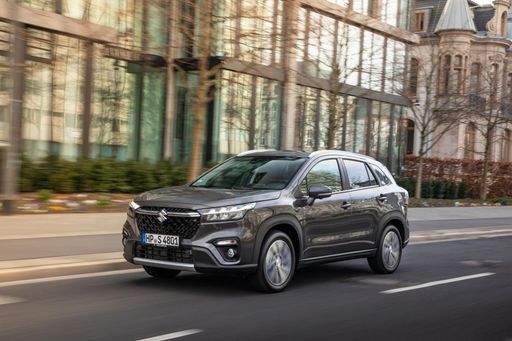
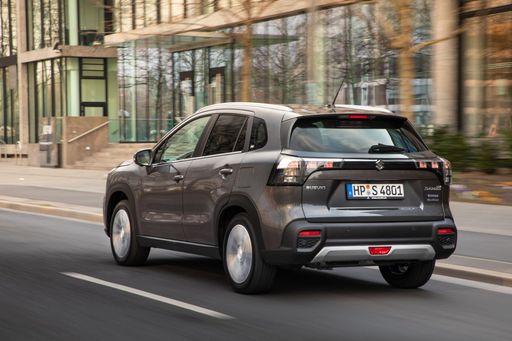
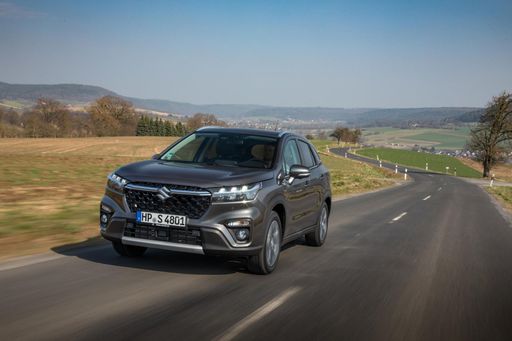
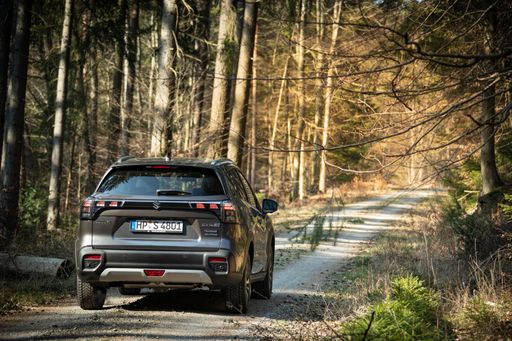
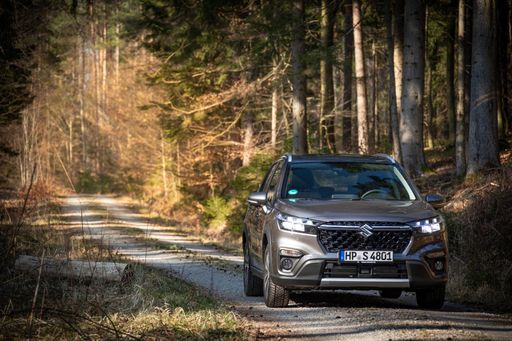
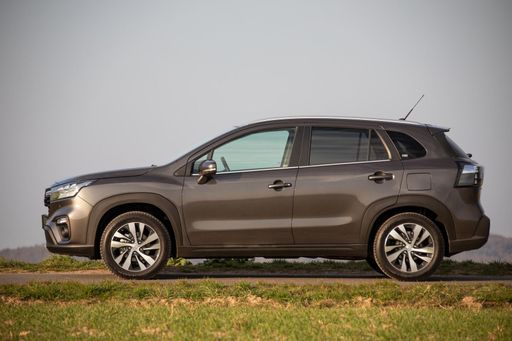
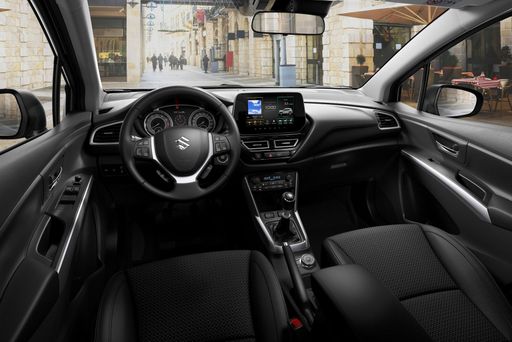
Costs and Consumption |
|
|---|---|
|
Price
34200 - 46300 £
|
Price
21800 - 34200 £
|
|
Consumption L/100km
2.8 - 6.8 L
|
Consumption L/100km
5.3 - 5.8 L
|
|
Consumption kWh/100km
-
|
Consumption kWh/100km
-
|
|
Electric Range
68 km
|
Electric Range
-
|
|
Battery Capacity
1.1 - 14.4 kWh
|
Battery Capacity
-
|
|
co2
55 - 154 g/km
|
co2
119 - 138 g/km
|
|
Fuel tank capacity
42 - 54 L
|
Fuel tank capacity
47 L
|
Dimensions and Body |
|
|---|---|
|
Body Type
SUV
|
Body Type
SUV
|
|
Seats
5
|
Seats
5
|
|
Doors
5
|
Doors
5
|
|
Curb weight
1526 - 1859 kg
|
Curb weight
1280 - 1385 kg
|
|
Trunk capacity
412 L
|
Trunk capacity
430 L
|
|
Length
4604 - 4645 mm
|
Length
4305 mm
|
|
Width
1882 mm
|
Width
1785 mm
|
|
Height
1673 - 1681 mm
|
Height
1580 mm
|
|
Max trunk capacity
1534 L
|
Max trunk capacity
1230 L
|
|
Payload
541 - 550 kg
|
Payload
395 - 405 kg
|
Engine and Performance |
|
|---|---|
|
Engine Type
Petrol, Full Hybrid, Plugin Hybrid
|
Engine Type
Petrol MHEV
|
|
Transmission
Manuel, Automatic
|
Transmission
Manuel, Automatic
|
|
Transmission Detail
Manual Gearbox, CVT, Automatic Gearbox
|
Transmission Detail
Manual Gearbox, Automatic Gearbox
|
|
Drive Type
Front-Wheel Drive, All-Wheel Drive
|
Drive Type
Front-Wheel Drive, All-Wheel Drive
|
|
Power HP
150 - 243 HP
|
Power HP
110 HP
|
|
Acceleration 0-100km/h
7.3 - 9.9 s
|
Acceleration 0-100km/h
-
|
|
Max Speed
195 - 200 km/h
|
Max Speed
180 - 185 km/h
|
|
Torque
240 Nm
|
Torque
235 Nm
|
|
Number of Cylinders
3 - 4
|
Number of Cylinders
4
|
|
Power kW
111 - 178 kW
|
Power kW
81 kW
|
|
Engine capacity
1496 - 2488 cm3
|
Engine capacity
1373 cm3
|
General |
|
|---|---|
|
Model Year
2025
|
Model Year
2025
|
|
CO2 Efficiency Class
E, D, B
|
CO2 Efficiency Class
D, E
|
|
Brand
Ford
|
Brand
Suzuki
|
What drivetrain options does the Ford Kuga have?
The Ford Kuga is available as Front-Wheel Drive or All-Wheel Drive.




